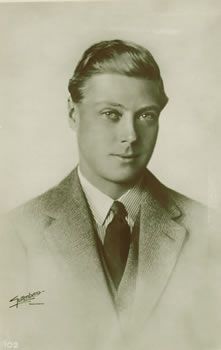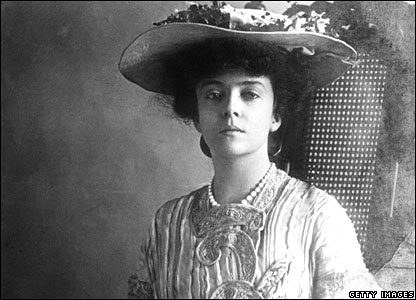
Edward VIII (later Duke of Windsor) followed in the footsteps of his grandfather Edward VII by matriculating at Oxford University when eighteen. Unlike his grandfather, however, the Prince of Wales was an underwhelming student–but like his grandfather, he had great charm and a knack for making friends. It was during his undergraduate years that he somehow acquired the nickname “Pragga Wagga,” which followed him into adulthood. In 1914, he was in his second year at Magdalen College, and like most of his contemporaries, the war took precedence over education. As you can see from the excerpt below, the “experiment” of being a normal student revealed the informality and dislike of fussy protocol that made him so popular during the 1920s.
In October 1912 the Prince of Wales, accompanied by his equerry, Major the Hon. William Cadogan, of the 10th Hussars, and Mr. Hansell, became Freshman at Magdalen College, Oxford. Unlike his grandfather, King Edward, who graduated as a nobleman, the Prince matriculated as an ordinary commoner of the College.
He regularly wrote and read essays for the President, Sir Herbert Warren, and was coached in “civics” and political and parliamentary history by the late Sir William Anson, the famous Warden of All Souls.
He resided in college rooms, dined in hall, or at one of the University clubs, and mixed freely with his fellow undergraduates. For nearly two years he played football for the college second eleven, became a private in the O.T.C., hunted, golfed, ran with the beagles, and drove his own motor car, not always with strict regard to speed limits. Although he did not take an active part in rowing, he was as keen as anyone among the crowd which followed his college crews along the towpath. His vacations he spent in continental travel, visiting Germany twice in 1912 and 1913 and Norway and Denmark, in 1914.
So entirely did the Prince enter into the life of an ordinary undergraduate, that to his contemporaries the recollection of his time at college is that of a particularly modest man, rather more retiring than his fellows, but possessed of a ready wit and a fund of good humour. No one realized more than he how the citizens of Oxford vied with the graduates and undergraduates in according him the greatest possible amount of freedom. The success of these efforts reflects much credit both on town and gown.
In the 1914 Eights’ Week special number of The Isis, the Oxford University magazine, the Prince was chosen as the “Isis Idol” of that issue. The following extract from the article gives a concise impression of his life at Oxford:
“It is known that it was some time before he settled down into the landsman’s life: nor does Oxford think any the less of him for his loyalty to the sea. Here we all know the sort of life he lives. To pry deeply into the course of his studies and amusements would be out of place. He has followed a special course of studies in History and Modern Languages. He has entered heartily into the corporate life of his college, and the usual athletic amusements of the undergraduate. He is a familiar figure at the meets of the Oxford country-side and on the Polo field; he has marched, fought, and camped with the Officers’ Training Corps. He has mixed with men who will probably help him in time to come to guide the future of the State or serve with him in the Army and other services. Oxford will lose him with genuine regret and a keen remembrance of his strenuous life and modest bearing, but she will send him forth to his new tasks in the larger world with loyalty and confidence.”
In June 1914, at the completion of his second year, there appeared in The Times a delightful and more intimate sketch by a fellow-graduate of his University life:
“The Prince’s life at Oxford,” he writes, “has been an experiment of a rather daring kind. It cannot be very easy, in planning the details of education, to reconcile the position of the Prince and the position of the man. On the one hand, it may be decided that it is impossible for the Royal personage to live the life of his contemporaries as they live it, or to go through the education of an ordinary individual. Thus King Edward was sent as an undergraduate to Oxford, but his position was never normal. He never occupied an undergraduate’s room in Christ Church; he was marked out by the special gown he wore, and when he attended a debate at the Union everybody present respectfully rose when he entered. Thus, however pleasant and valuable his Oxford days may have been, King Edward can never have participated in the free good-fellowship which we all enjoy; he can never have tasted to the full the fun and interest which come alone from the irresponsible and equal association of friends. In realizing in its entirety the incomparable happiness of Oxford at its best, perhaps the most humble undergraduate was more fortunate than he.
“But for the present Prince it was decided otherwise. He was to be in every sense an ordinary undergraduate. No distinctions were to be observed by those he met in manner or in style of speech. There were to be no special privileges. He was to come up as a ‘fresher’ and behave as a ‘fresher.’ Thus, when he eventually arrived, we found that he was in no way different from any other undergraduate, except that he looked rather more youthful than most, that he still retained a passionate and almost wistful love of his life as a sailor, and that he had taken the unusual course for an undergraduate of bringing with him an equerry and a tutor, who lurked somewhere in the background.”
It was not without grave consideration and a certain amount of trepidation that the Prince had been permitted to enter college as an ordinary freshman. Such a proceeding had never been sanctioned before, for it was recognized to be no easy task for a Prince to mix on such terms of equality with his future subjects without losing any dignity of his rank. Every one of his contemporaries there must recall, with admiration, the success with which he crowned the very difficult and delicate experiment.
— Edward, Prince of Wales: An Authentic Biography (1921) by G. Ivy Sanders




Well, I’m NOT surprised the Prince was as dense as his family members. It seems the most academic are the royal women.
They are the ones who complete their higher educations and are able to do much more(with the exception of Diana’s sons who have done very well) with their educations and professions.
Possibly a combination of the burden of being a male royal and everyone taking it for granted that they don’t need to be super intelligent–they’re men! 😉
Dim but attractive and good natured!
Definitely. But I wonder: does a monarch need more than instinct and personability?
Perhaps his lack of intellectual prowess may have originated in his childhood–domineering, rigid father and remote mother. We now know that emotional nurturing, or lack therof, can deeply effect a child’s capacity to learn.